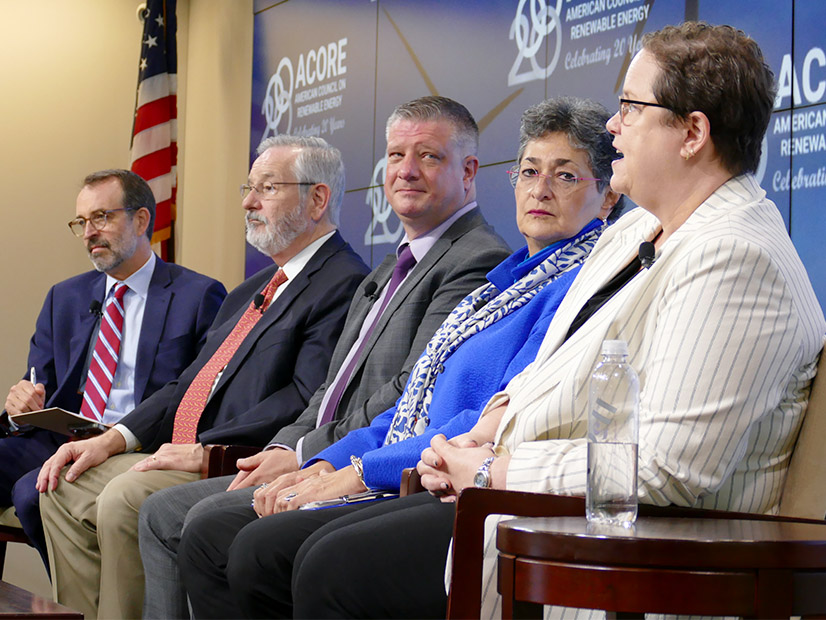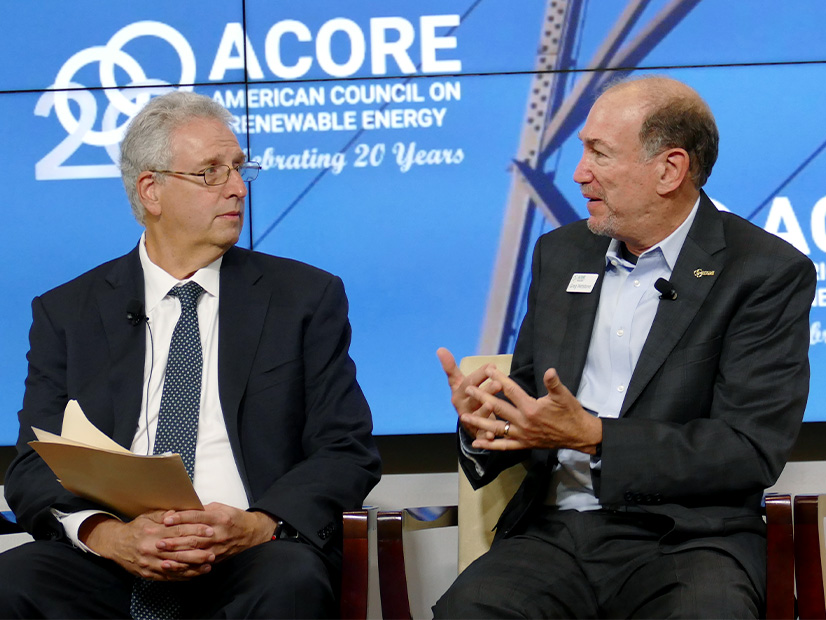
WASHINGTON — MISO’s Jennifer Curran is worried that U.S. decarbonization efforts are relying on magical thinking.
“I think we’re all really focused on this end goal, which is really good … this carbon-free future. But as an industry, we’re not spending nearly enough time talking about how do you actually get from point A to point B reliably,” Curran, MISO’s senior vice president of planning and operations and chief compliance officer, said during a panel discussion at the American Council on Renewable Energy’s (ACORE) Grid Forum last week.
“It’s a little bit of, ‘Here’s where we are, a miracle occurs, and then we’re suddenly carbon-free. So really digging in and thinking about the hard work of how do we actually go through this transition, and keep this system reliable?” is essential, she said.
Moving Beyond One-day-in-10-years
Curran said the industry needs to shift from its reliance on the one-day-in-10-years reliability construct.
“I hear a lot of people say, “Well, that’s okay, we’ll just do some demand-side management or [add] some batteries, and we’ll shave the peak,’” she said. “Well that’s not our problem right now. We’re not looking at a five-hour problem; it’s a five-day problem. In January of 2020, MISO went 72 consecutive hours with less than 5% of our wind output. … In 15 of those hours we actually had negative wind output — station power pulling from the grid. So the question that I would like us to focus more on is how do we deal with these energy adequacy questions? How do you deal with the three days or five days? And what technology is it going to take to get us there?”
Mark Lauby, NERC’s senior vice president and chief engineer, agreed on the need to move beyond the one-in-10-day construct, which he said was based on “random equipment failures, as opposed to weather.”
“Weather is not random; sometimes it’s a bit predictable. And we need to start bookending that maybe through climate change models and all that to develop scenarios,” he said. “Things like no nuclear [power] is available, or it’s really cold or we have a forest fire … or it’s too windy in Iowa. … We have to … be able to survive those scenarios. And that becomes part of your integrated resource plan. … Those [scenarios] will then help drive: What are our transmission needs? How big do you need to be to solve this problem across the nation?”
“[It] used to be that capacity was king. The king has no clothes,” Lauby continued. “It’s energy and essential grid services.”
Jason McDowell, senior director of technology, strategy and policy for GE Energy Consulting, praised NERC’s work with industry on developing reliability guidelines for inverter-based resources. “The first thing to do — and that we really need a lot more visibility [on] — is understanding where we have grid stability issues, weak grid issues; understanding where there might need to be more advanced capability of inverter-based resources and how they work together with more conventional synchronous power generation.”
‘Self-inflicted Wounds’
Consultant Alison Silverstein repeatedly cited Texas’ experience during February 2021’s winter storm, saying the hundreds of deaths that followed ERCOT’s load sheds resulted from “the self-inflicted wounds [of] 30 years of underinvestment in energy efficient homes and businesses in Texas.
“One of the most important things we can do to make the world safer [in addition to] transmission and more renewables is energy efficiency,” she continued. “Energy efficiency can buy time for us to figure out how to do better integration of renewables and build more transmission. It will improve reliability because it will bring down both peak at summer and winter.”
Those who died during in 2021 were “not rich people,” she added. “Those were people with low incomes, living in bad housing. Energy efficiency can help them significantly, and it can slow the rate at which we have to spend money to increase … the grid to improve reliability. And that can help these people … survive. Because the grid is going to fail, no matter what. No matter whether it’s transmission, no matter whether it’s renewables, no matter whether it’s storms — the grid’s going to fail again and again. And energy efficiency helps to protect people’s lives.”
Silverstein also made a plug for transmission, saying the risk of overbuilding is minimal.
“At the few lines that we have seen built for economics, they turned out to be essential for reliability. Every line we have built for reliability has turned out to have extraordinary value to improve the cost-effective delivery of electricity and to flatten costs for customers. It is very rare that new transmission will ever be stranded. The only transmission that’s been stranded that I know of has been attached to a coal plant or has been attached to something on a coast that is going under water.”
Silverstein urged the audience to read a July 2021 paper she wrote with Robert Zavadil advocating for creation of a national electric transmission authority, saying such an organization is needed to avoid unplanned and ineffective transmission expansion.
“We really need the level of concerted vision and analysis that something like a national electric transmission authority could bring to this effort that doesn’t exist today,” she said. The paper “is a useful stalking horse. … It is [such a] radical proposal and people will react to it so badly that anything that you all want to recommend as an alternative will look super reasonable.”
Silverstein also called for an investigation into the poor performance of ERCOT’s black start generation during the February storm.
“Over 40 to 50% of ERCOT’s black start plants were down. They were frozen. They didn’t have enough fuel, whatever the reason,” she said. “We came five minutes from [an] ERCOT-wide collapse, and without interconnection to the rest of the nation, we would have been down for weeks because our black start capability was gone. …
“No one has … ever investigated this and figured out why the plants that we were paying good money to be available in black start were not available. Why they have not been penalized? What standards are wrong? Clearly they met their obligations, which means the obligations were bad.”
Defending Clements
Grid Strategies President Rob Gramlich, who moderated the discussion, asked Silverstein about a Fox News story accusing Commissioner Allison Clements of impropriety for speaking at a “funders only” event hosted by her former employer, the Energy Foundation.
When he and Silverstein served as aides to former FERC Chair Pat Wood, Gramlich said they met with scores of stakeholders.
“We met with everybody who had the sense to ask,” Silverstein confirmed. “It is your job as a federal official to talk to everyone to make sure that as much information is available … within the bounds that your lawyers allow you to talk. It is your right as a citizen or as an organization to come into a commissioner’s office and the chairman’s office and share your views and ask for the commissioners’ input and guidance. And so Commissioner Clements was doing her job and I applaud her for doing that.”
“If she did anything wrong then every single commissioner, and just about all their advisers for the last 25 years, violated the same thing,” Gramlich said.
Glick: Not Worrying About Reappointment
In remarks opening the conference FERC Chairman Richard Glick encouraged attendees to help shape the future by getting involved in RTO stakeholder discussions on market rules and transmission, even though he acknowledged, “they can get very tedious and boring.”
“A lot of the decisions that are made … are kind of — I wouldn’t say fully baked because FERC still has to review them and consider them and determine whether they’re just reasonable. But a lot of those decisions, they get worked out during the stakeholder discussions,” he said.

Glick said grid reliability is “the subject of the day in many ways,” noting California’s scramble to shave loads during a heat wave in September and the commission’s recent forum in New England. (See FERC Comes to Vermont and Leaves with a New England-sized Headache.)
“We’re experiencing extreme weather like we’ve never seen before. And that’s going to continue on, most experts say,” Glick said.
He said the Inflation Reduction Act “will, almost undoubtedly, prove to be a game changer for [ACORE members] and for the good of the country.”
Glick said he was not worrying about whether he will be confirmed to a second term on the commission. President Biden has renominated Glick but Sen. Joe Manchin (D-W.Va.), chair of the Energy and Natural Resources Committee, has yet to signal his support. Although Glick’s term expired June 30, he can remain in his post through the end of the current congressional session in December.
“I’m being told that there’s a lot of folks — the White House, Sen. [Chuck] Schumer (D-N.Y.) and others — that are working hard towards confirmation. They are confident,” he said.
“I just use an analogy: My son plays a lot of baseball and sometimes he’s on the mound. And you know, the guy behind him makes an error and sometimes he used to get really upset … and then he loses focus. And I just say to him all the time, you can only control what you can control and not worry about others. And at FERC that’s what I’m trying to do, is not think about that. I just feel we have a lot of day-to-day work to do. Try to focus on that on a daily basis, and whatever happens happens.”



